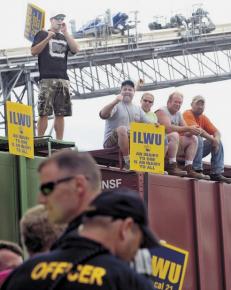ILWU takes on union-buster
reports on a battle for the future of the ILWU at a port in Washington.
LONGVIEW, Wash.--"We're going to fight for our jobs in our jurisdiction. We've worked this dock for 70 years, and to have a big, rich corporation come in and say, 'We don't want you,' is a problem. We're all together. We're all going to jail as a union."
Those were the words of International Longshore and Warehouse Union (ILWU) Local 21 President Dan Coffman to a reporter July 11 as he waited to be arrested along with 100 other Local 21 members at the Port of Longview, 130 miles south of Seattle in the southwestern corner of Washington state.
They summarize the sentiments of the 200 members of Local 21, who have escalated a series of militant actions since late May in a two-year battle to force corporate conglomerate EGT Development to honor its contract and use ILWU labor at its new facility.
Last week, those actions forced EGT to delay its operations. According to the Longview Daily News, around 6 a.m. on July 22, some 100 members of Local 21, who operate the Ports of Longview and Kalama, set up a picket line outside the EGT gates, blocking some workers from entering the site. In response, EGT indefinitely shut down its facility--which is in its testing phase, with the hope that it will be fully operational by the fall harvest--and suspended grain shipments to it.

THE STRUGGLE began when EGT signed a lease with the Port of Longview in June 2009 to build a $200 million terminal on a 38-acre site. EGT announced it wouldn't use ILWU members to operate the terminal--and that it had made a deal for another union, International Union of Operating Engineers Local 701, to provide longshore workers, in defiance of the ILWU's recognition as the sole representative of longshore workers at West Coast ports.
For two years, a legal battle has ensued that may not be settled until a non-jury trial set for April 2012--but that would be months after the terminal is set to open.
In response to the imminent threats to their jobs, the ILWU began to step up its actions starting in May. There have been informational pickets at busy intersections in Longview, a rally of over 1,000 at EGT's headquarters in downtown Portland, and protests outside Port of Longview commissioners' meetings.
On July 11, according to local police, around 100 members of Local 21, including union leaders like Coffman, were arrested for allegedly using a pickup truck to tear down a chain link gate at the EGT terminal.
Then, on July 13, starting around 11 p.m., over 600 Local 21 members and supporters participated in a mass direct action to block the railroad tracks into the facility, preventing a Burlington Northern Santa Fe train from delivering grain. After a four-hour standoff, the train had to be rerouted to a terminal in Vancouver, Wash.
Local 21 is up against several nasty corporate giants in this fight--EGT Development is a joint venture of Japan-based Itochu Corp, South Korea's STX Pan Ocean and St. Louis-based Bunge North America. Itochu ranks 201 on Fortune's Global 500 list of the world's largest corporations, and Bunge is number 182.
For over two years, EGT has complained about the extra $1 million in labor costs it would take to pay for ILWU members, compared to non-union labor. Yet Bunge's profits were just under $2.5 billion in 2010. Think Archer-Daniels Midland and Cargill to get an idea of Bunge's main competitors.
Disgustingly, the operating engineers union agreed to scab on Local 21 and take longshore jobs at the terminal. But as the July 22 picket by Local 21 members showed, scabs could literally end up with egg on their face--Longview police alleged eggs were thrown at scab cars.
The importance of this struggle is crystal clear to the ILWU. Some of the biggest corporations in the world are trying to bust the union that has operated all major ports on the West Coast for the last 70 years.
The EGT elevator, which is expected to employ about 50 workers, would be the first built on the West Coast in the last 25 years, so the stakes are high for the ILWU. The union also knows the outcome of this battle is being watched closely by the Pacific Maritime Association, which will negotiate a new coastwide contract in 2014.
With labor nationally facing budget cuts, attacks on collective bargaining rights, and slashed wages, pensions and health care, the outcome of this struggle could affect workers all over the U.S. The tactics Local 21 has used--with hundreds of workers blocking railroad tracks and directly confronting scabs provide important lessons for the direction labor will need to go in as Corporate America escalates its current war on U.S. workers.


